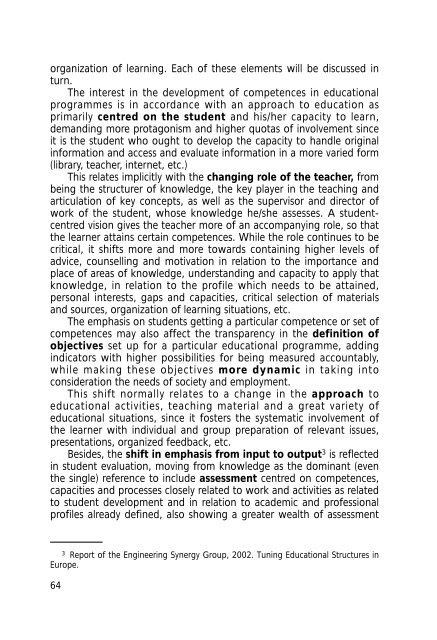Final Report Pilot Project - Relaciones Internacionales de la ...
Final Report Pilot Project - Relaciones Internacionales de la ...
Final Report Pilot Project - Relaciones Internacionales de la ...
You also want an ePaper? Increase the reach of your titles
YUMPU automatically turns print PDFs into web optimized ePapers that Google loves.
organization of learning. Each of these elements will be discussed in<br />
turn.<br />
The interest in the <strong>de</strong>velopment of competences in educational<br />
programmes is in accordance with an approach to education as<br />
primarily centred on the stu<strong>de</strong>nt and his/her capacity to learn,<br />
<strong>de</strong>manding more protagonism and higher quotas of involvement since<br />
it is the stu<strong>de</strong>nt who ought to <strong>de</strong>velop the capacity to handle original<br />
information and access and evaluate information in a more varied form<br />
(library, teacher, internet, etc.)<br />
This re<strong>la</strong>tes implicitly with the changing role of the teacher, from<br />
being the structurer of knowledge, the key p<strong>la</strong>yer in the teaching and<br />
articu<strong>la</strong>tion of key concepts, as well as the supervisor and director of<br />
work of the stu<strong>de</strong>nt, whose knowledge he/she assesses. A stu<strong>de</strong>ntcentred<br />
vision gives the teacher more of an accompanying role, so that<br />
the learner attains certain competences. While the role continues to be<br />
critical, it shifts more and more towards containing higher levels of<br />
advice, counselling and motivation in re<strong>la</strong>tion to the importance and<br />
p<strong>la</strong>ce of areas of knowledge, un<strong>de</strong>rstanding and capacity to apply that<br />
knowledge, in re<strong>la</strong>tion to the profile which needs to be attained,<br />
personal interests, gaps and capacities, critical selection of materials<br />
and sources, organization of learning situations, etc.<br />
The emphasis on stu<strong>de</strong>nts getting a particu<strong>la</strong>r competence or set of<br />
competences may also affect the transparency in the <strong>de</strong>finition of<br />
objectives set up for a particu<strong>la</strong>r educational programme, adding<br />
indicators with higher possibilities for being measured accountably,<br />
while making these objectives more dynamic in taking into<br />
consi<strong>de</strong>ration the needs of society and employment.<br />
This shift normally re<strong>la</strong>tes to a change in the approach to<br />
educational activities, teaching material and a great variety of<br />
educational situations, since it fosters the systematic involvement of<br />
the learner with individual and group preparation of relevant issues,<br />
presentations, organized feedback, etc.<br />
Besi<strong>de</strong>s, the shift in emphasis from input to output 3 is reflected<br />
in stu<strong>de</strong>nt evaluation, moving from knowledge as the dominant (even<br />
the single) reference to inclu<strong>de</strong> assessment centred on competences,<br />
capacities and processes closely re<strong>la</strong>ted to work and activities as re<strong>la</strong>ted<br />
to stu<strong>de</strong>nt <strong>de</strong>velopment and in re<strong>la</strong>tion to aca<strong>de</strong>mic and professional<br />
profiles already <strong>de</strong>fined, also showing a greater wealth of assessment<br />
3 <strong>Report</strong> of the Engineering Synergy Group, 2002. Tuning Educational Structures in<br />
Europe.<br />
64


